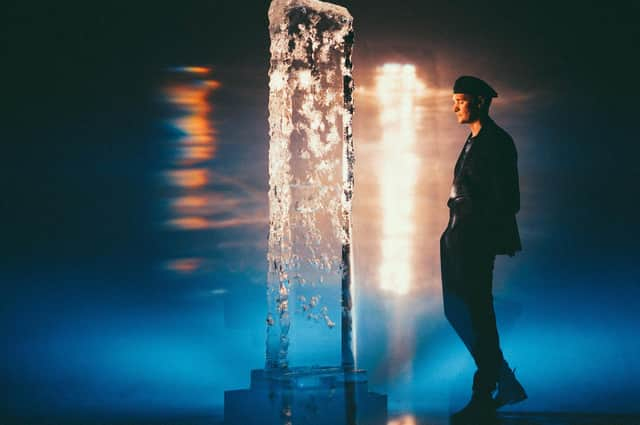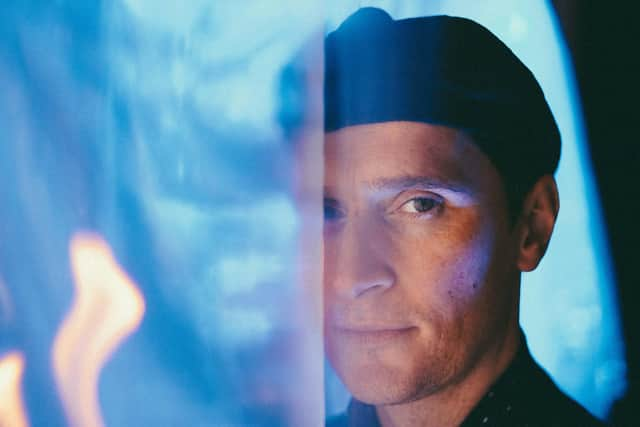Erland Cooper: 'Somewhere between despair and hope good ideas tend to pop up'


In a recording career spanning 14 years with two bands – Erland & The Carnival and The Magnetic North – and as a solo artist, he has regularly drawn inspiration from the natural world. “I try to dig a little deeper into the soil of the narrative on the creative side of it,” he tells The Yorkshire Post. “I try to plough that field as best I can in a way that interests me that touches on not just music but science and other art forms, and that quote has stuck with me in a way as a joyful protagonist pushing a little bit further.”
The 38-year-old’s latest project, Folded Landscapes, is an observation on climate change which he hopes will inspire listeners to do something about it. “I’m not the first and I won’t be the last artist to write about the natural world and the very precious past, present and future, but I spend most of my time observing and I noticed many things as summers get hotter and how we react to things,” he says. “There’s an echo chamber online but by looking out of the window, I noticed the disparity. I thought I would actually write a piece about time and temperature, but that evolved into what is now Folded Landscapes.”
Advertisement
Hide AdAdvertisement
Hide AdAmid a “cacophony of voices online, in print, in the news, this narrative of the challenges but not the solutions”, he noticed that it was “hard for people to understand the facts”.
“I think it was Brian Eno who put it best when he said if there’s a lot of facts it’s hard to believe, but if they feel something, that’s truly when they change their mind on something and can actually be moved to do something that helps not just themselves but other people. I think music is one of those art forms that can be a catalyst for that.
“The other thing I noticed,” he says, “it that within the doom and gloom of the news on certain heatwaves in the subsequent years I would witness that kind of fear online and then I looked out of the window in Victoria Park (in London) and it was like a dance to the end of days. There was a joy, there was T-shirts and shorts. Whether there’s a climate emergency or not, you should celebrate the natural world.
“I think those two linear points made me think about how I could write a piece that almost traversed the timeline, and was almost temperature rise in itself, and find a way to kind of smuggle in these narratives under the observations.”
Advertisement
Hide AdAdvertisement
Hide AdAs Cooper’s music develops and it becomes more hopeful by the sixth and seventh movements, the fidelity of the audio gets worse. “That’s the only thing I’m saying – you can dance to the end of days but below your feet things are perhaps more fragile than ever,” he explains.


Not one to do things by half, Cooper recorded the chillier early movements with the Scottish Ensemble in a freezing cold factory in Glasgow at the start of 2021 before moving to a warmer studio in Edinburgh for the later parts.
“Everything had to mimic the temperature rise,” he says. “If you can imagine the whole concept, not just the compositional side but the production side and the performance side, even the release side, everything is thawing and it felt really settling.
“I remember it was January 8 two years ago, people were free of their locked enclosures and it was maybe -2C, just sub-zero, when you see the mist in front of your face as you move. I remember distinctly everyone was in mittens, all the string players needed mittens so they could play the violins. Mittens, beanies and smiling faces, it was joyful. But equally, when you’ve got two or three hours in a cold environment, it’s amazing how much you can get done.
Advertisement
Hide AdAdvertisement
Hide Ad“There was a real sharp sense of focus and that interested me because also when I applied heat, when I gave everybody a heat source, because it was freezing cold, we all gathered around it. It was like primitive, Neolithic, it was amazing. We all wrapped around the heat and then we went back for another take, and that made me think about how we react to comfort. What would comfort mean to people in the future? What did comfort mean to people before us? And that fed into the narrative of the project as well.”
Folded Landscapes ends with a “classical ceilidh” during which the audio quality starts to deteriorate, a process that occured when Cooper left the tape on the studio roof during the hottest day of last year. “It was hot and sweaty in the studio and I had the idea of baking it on the studio roof so that the fidelity of the audio would get sunburnt and then a bit like baking bread I would mix that back into the audio itself. But the fact that it happened to be 41C on July 19 that was a coincidence... That was chance but I always have an aleatoric element in everything I do.”
Compositionally, Cooper says the piece “did and didn’t” develop through the use of field recordings. “What was fascinating to a geek like me was the frequency spectrum of melting ice and the frequency spectrum of a burning wildfire is almost identical, and it kind of sounds the same,” he says. “When I discovered that I found it quite spooky, this idea that the Great Thaw and the Great Burn sound quite similar. That encouraged some of the sonic characteristics – I would say the clearest example is using a recording of an avalanche combined with the lyric of Simon Armitage and then a soprano singing his words saying ‘avalanche’ and then hearing the avalance sounding like a timpani. Again that is the same frequency section as a timpani in an orchestra. Those things were intentional and I was quite happy to discover, but really it was setting this idea in motion that I would go from -2C to 40C and see what effect it has not just on the players or the music, but also on the fidelity, the audio quality of the tape itself. As the music becomes more joyful or optimistic if you listen carefully to a keen ear the quality is becoming distorted, it’s got crackles and pops, but those are quite musical to me, I rather like them.
“I’ve had a few people message to say that their vinyl is a bit dodgy and I’ve asked them to listen to the digital masters. But that was intentional.”
Advertisement
Hide AdAdvertisement
Hide AdClimate activist Greta Thunberg’s “famous UN speech” is also incorporated into the piece as a call for action. “The United Nations let me licence that, which was very gracious of them,” Cooper says. “I decided not to use the whole speech, you didn’t need it. That part acts as a kind of tipping point on the record where it’s quite stark, it’s really a glacial thaw. It’s like a slow glacial ascent and then a toboggan down the other side and that’s what I intended it to be, if you’re patient you eventually get there.
“I know it’s a hard listen to some people but I suppose it’s a hard subject matter to listen to as well. I hope I got the balance right with regards to despair and hope; somewhere between despair and hope good ideas tend to pop up.
“As well as Greta, there’s a load of other voices, news reports from Scotland, England and America. Really what it’s suppose to symbolise is that cacophony of noise which is hard to pick things out. It’s not just about the message, it’s actually about what it means to hear all of them at the same time and then have it all shut up and then you just hear music which to me represents the flight of a starling migration as the strings build up.
“But with Simon Amitage’s words, I’m pinching myself because one, he performed it at the London premiere which was very gracious, and two, in fact he used the words, it was like a spontaneous happening, like working together where these words just landed, and before I knew it, they had a melody and then the soprano was singing them. It was all done very quickly towards the end of the project. As I say, I leave the door open for something like that to come in. I’ll dine out on that.”
Advertisement
Hide AdAdvertisement
Hide AdCooper will donate some of the royalties from this project to Brian Eno’s environmental charities. “As a writer, you can petition any percentage you want to any co-writer, and this idea of the Earth itself being the co-writer, by allocating one per cent of a composition to the Earth, perhaps one day the Earth’s back catalogue will be even greater than Ed Sheeran’s,” he says. “Perhaps Ed Sheeran could donate one per cent of one of his biggest pop songs and it would go a long way. It’s a poetic and lovely way if you don’t have money in your back pocket to donate to think about future ideas. I think it’s ideas that are the thing we need more than anything right now.”
Ultimately, Cooper hopes listeners “if they’re patient with all the movements” of Folded Landscapes will find “a hopeful reflection with in it”. “To anything, whether it’s an internal landscape or an external one, it’s an opportunity to celebrate and cherish. I’ll pinch those words from Sir David Attenborough, who said something along the lines of ‘waste not, celebrate and cherish’. I think it’s a lovely mantra to live by, and if music can make you feel any of those things then great. But also music is there to be enjoyed in different headspaces at different times in different places. I hope folk are patient with it and climb the steep ascent then maybe toboggan down the other end.”
This month, Cooper is taking the piece on tour. For the premiere in London, he performed four concerts which were accompanied by an 8ft-high ice sculpture melting throughout the 50-minute duration of the performance, eventually revealing plants and foliage from the natural world.
On this occasion, he says: “I just want to let the performers and the room and the acoustic and the audience do the talking. I don’t need to take an ice sculpture with me for every performance. I’m going to have some incredible guests and very night will feel different and really special, and I hope people will enjoy it. We’ll also play some of my Orkney songs. It will just be a celebration of the natural world and maybe a little transportation up and down the islands of the United Kingdom.”
Folded Landscapes (Piano Version) is out on November 3. Erland Cooper plays at Left Bank, Leeds on September 21 and Hebden Bridge Trades Club on Sepetmber 26. https://www.erlandcooper.com/
